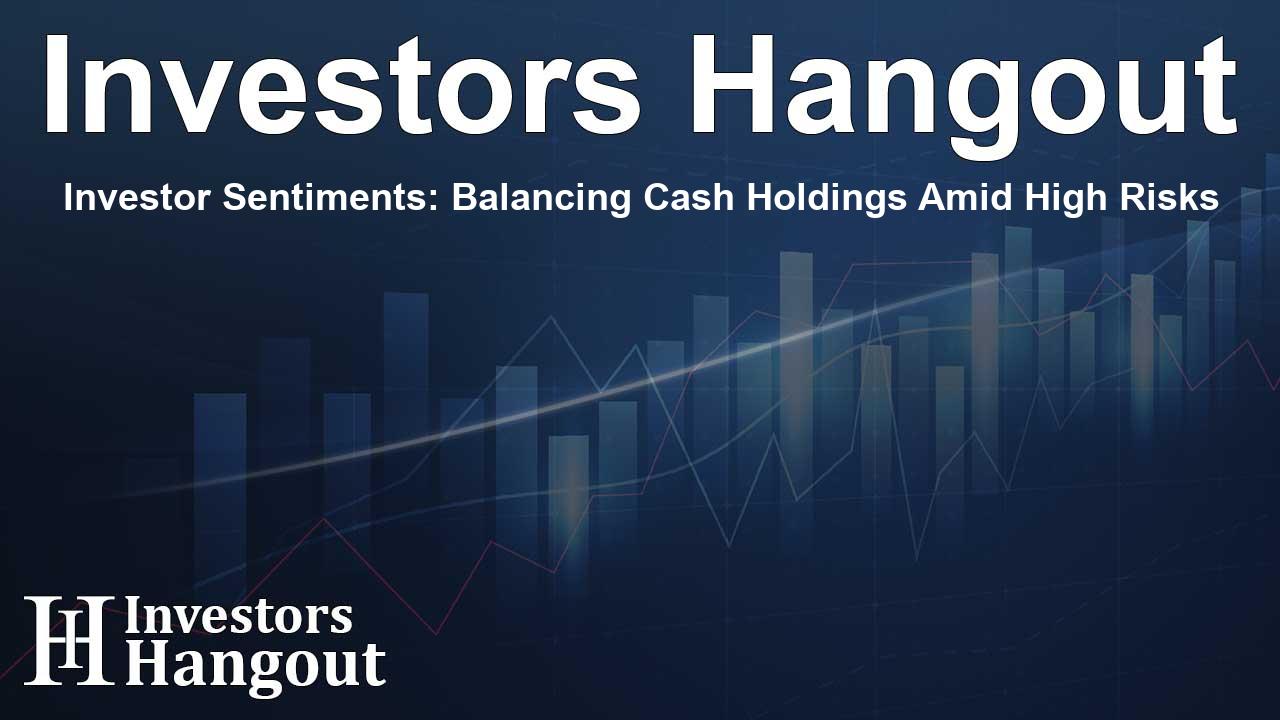Investor Sentiments: Balancing Cash Holdings Amid High Risks

Investors Share Their Cash Positions
Among the investing community, a common discussion has emerged regarding cash holdings in the current economic climate. An investor recently posed a thought-provoking question: "What percentage of cash are you holding now?" As markets rise and economic instability looms, many investors are grappling with how much liquidity to maintain. Factors like high price-to-earnings ratios and global tensions are prompting some to hold significant cash reserves.
Pervasive Perspectives on Cash Holdings
The responses on forums reveal a spectrum of opinions. While some investors are fully engaged in the market, others prefer to remain on the sidelines with substantial cash. Many fall into the range of holding between 0% and 5% for long-term investment strategies, whereas others are preparing for a downturn with over 50% in cash.
Concerns Over Market Timing
One commenter expressed an emotional struggle: being about 80% in cash due to concerns about government actions affecting market stability. This feeling resonates with many who are wary of the current market dynamics.
Interest Rates as a Factor
Interest rates also play a crucial role in investors' decisions. With cash yielding returns around 4.2%, the allure of keeping funds liquid instead of investing in equities is compelling. Investors are strategically evaluating the opportunity costs associated with market fluctuations.
The Aggressive Approach
On the other side of the debate, some argue that hoarding cash is a waste of potential returns. They are committed to remaining in the market, perceiving inactivity as a lost opportunity for growth.
Market Sentiment and Anxiety Levels
The market's current mood is decidedly mixed. Many perceive the environment as overly risky and feel the unusual stability of the market is delusional. One user remarked that if the risks were not manifesting, now would be the time for a downturn to occur.
Panic Selling Insights
Several participants acknowledged recent panic selling, chronicling how they exited positions only to watch the market recover. This pattern of behavior highlights the psychological challenges investors face when determining the right time to enter or exit the market.
A Range of Cash Holdings
Responses varied, with some investors indicating they are holding between 10% and 30% cash to act as a protective buffer. This so-called “dry powder” provides a sense of security amidst unpredictability in the market.
Safe Investments Gaining Popularity
Investors have shown a growing interest in alternatives to traditional equities, such as short-term Treasuries and high-yield savings accounts, which are currently offering attractive returns. With interest rates providing compelling opportunities, many question the urgency of returning to higher-risk investments.
Emotional Reflections on Investment Strategies
Conversations have taken on a reflective tone, with one investor noting the psychological complexity of navigating such a volatile market. They suggested that many would rather endure market dips than miss out on potential gains.
Frequently Asked Questions
What percentage of cash are most investors holding currently?
Responses range widely, with some holding up to 50% cash and others closely committed to being fully invested.
What are the main concerns influencing cash holdings?
Investors cite high price-to-earnings ratios, geopolitical tensions, and interest rates as significant factors impacting their cash positions.
How do interest rates affect investment decisions?
Higher cash yields make it appealing for investors to hold liquidity, especially during uncertain market conditions.
Are there common strategies for using cash in investments?
Investors use cash as a buffer for market corrections or as dry powder to capitalize on forthcoming opportunities at lower prices.
How do psychological factors influence investment choices?
The emotional aspect of investing can lead to panic selling or holding back from entering the market, affecting overall strategies.
About The Author
Contact Owen Jenkins privately here. Or send an email with ATTN: Owen Jenkins as the subject to contact@investorshangout.com.
About Investors Hangout
Investors Hangout is a leading online stock forum for financial discussion and learning, offering a wide range of free tools and resources. It draws in traders of all levels, who exchange market knowledge, investigate trading tactics, and keep an eye on industry developments in real time. Featuring financial articles, stock message boards, quotes, charts, company profiles, and live news updates. Through cooperative learning and a wealth of informational resources, it helps users from novices creating their first portfolios to experts honing their techniques. Join Investors Hangout today: https://investorshangout.com/
The content of this article is based on factual, publicly available information and does not represent legal, financial, or investment advice. Investors Hangout does not offer financial advice, and the author is not a licensed financial advisor. Consult a qualified advisor before making any financial or investment decisions based on this article. This article should not be considered advice to purchase, sell, or hold any securities or other investments. If any of the material provided here is inaccurate, please contact us for corrections.
